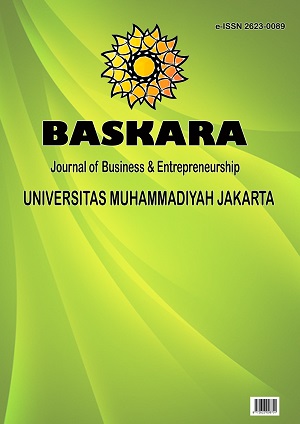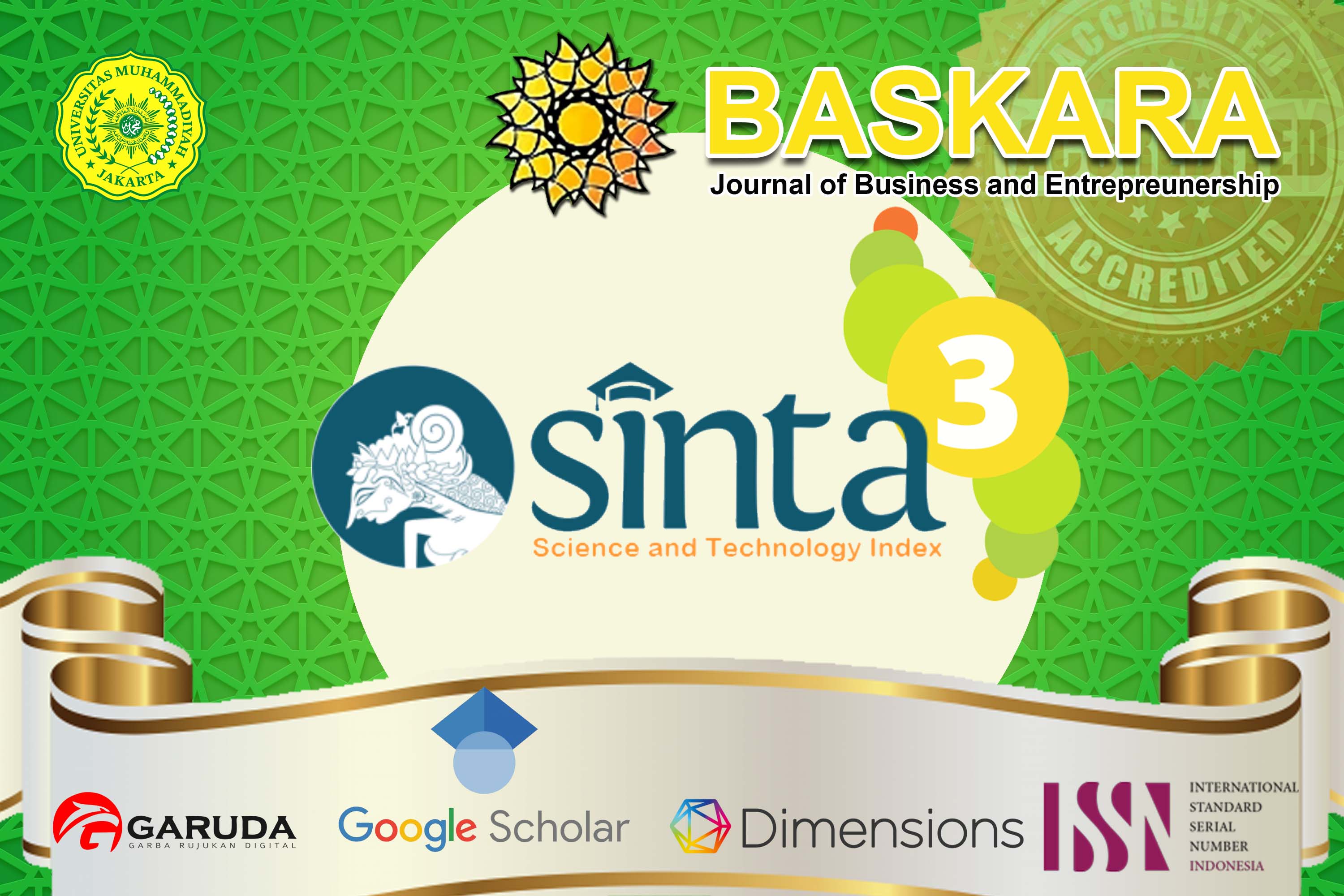Digital Landscape Design for Infrastructure Business on Islamic Financial Technology Platforms in Indonesia
DOI:
https://doi.org/10.54268/baskara.v5i1.13232Keywords:
Sharia Fintech, Small Micro Medium Enterprises, Digital Business InfrastructureAbstract
The trend of digitization is a phenomenon that is quite popular in recent years where this phenomenon has entered all sectors, including the financial sector. The emergence of financial technology innovation is evidence that the digitalization phenomenon has entered the financial and banking sectors. Therefore, this innovation is not only present to provide financial services, but must be able to provide solutions, especially for micro, small and medium businesses as a fintech business segment. The research method used in this study is a descriptive qualitative approach. The results of the research produced are designing the structure of fintech application features to answer the problems that occur in MSMEsReferences
Ansari, M., Almunawar, MN, & Masri, M. (2020). Financial technology and disruptive innovation in business: Concept and application. International Journal of Asian Business and Information Management , 11 (4), 29–43. https://doi.org/10.4018/IJABIM.2020100103
Ansori, M. (2019). The Development and Impact of Financial Technology (Fintech) on the Islamic Finance Industry in Central Java. Journal of Islamic Studies , 5 (1), 31–45.
Azizah, NL, Indahyanti, U., Latifah, FN, & Sumadyo, SB (2020). Utilization of Digital Bookkeeping in the MSME Group in Sidoarjo as a Media for Financial Planning. Community Empowerment , 6 (1), 64–70. https://doi.org/10.31603/ce.4378
Baihaqi, J. (2018). Financial Technology Peer-To-Peer Sharia-Based Lending in Indonesia. TAWAZUN : Journal of Sharia Economic Law , 1 (2), 116. https://doi.org/10.21043/tawazun.v1i2.4979
Billah & Nuntupa, ZI (2021). The Role and Constraints of Sharia Fintech in MSMEs. Ar-Ribhu: Journal of Islamic Management and Finance , 2 (2), 256–266. https://doi.org/10.55210/arribhu.v2i2.671
Faih, RN (2019). Analysis of Islamic Financial Technology (Fintech) Transactions in the Shariah Maqashid Perspective. Islamic Journal of Economics and Banking , 6 (2), 167–175. https://doi.org/10.19105/iqtishadia.v6i2.
Fajar, M., & Larasati, CW (2021). The Role of Financial Technology (Fintech) in the Development of MSMEs in Indonesia: Opportunities and Challenges. Humanists (Humanities, Management and Science Proceedings) , 1 (2), 702–715. http://www.openjournal.unpam.ac.id/index.php/SNH
Fitrijanti, HHNS (2020). Islamic Fintech (Financial Technology) Opportunities and Challenges in Indonesia. Scientific Journal of Islamic Economics , 5 (3), 326–333. https://doi.org/10.29040/jiei.v5i3.578
Humaira, I., & Sagoro, EM (2018). The Influence of Financial Knowledge, Financial Attitudes, and Personality on Financial Management Behavior on Small and Medium Enterprises in the Batik Craft Center of Bantul Regency. Nominal, Barometer of Accounting and Management Research , 7 (1). https://doi.org/10.21831/nominal.v7i1.19363
Ilmi, MN, & Metandi, F. (2020). Production and Sales Information System Design in Bakpia MSMEs (Aa Bakery Case Study). Just TI (Journal of Applied Information Technology Science) , 12 (1), 17. https://doi.org/10.46964/justti.v12i1.180
Jayalath, JARC, & Premaratne, SC (2021). Analysis of Key Digital Technology Infrastructure and Cyber Security Consideration Factors for Fintech Companies. International Journal of Research Publications , 84 (1), 128–135. https://doi.org/10.47119/ijrp100841920212246
Latifah, FN, Maika, MR, & Masruchin, M. (2017). Bookkeeping in an Islamic Perspective Case Study Bookkeeping for Beginner Entrepreneurs Housewives in Kenongo Village. Journal of Shield : Islamic Banking and Finance , 1 (2), 117. https://doi.org/10.21070/perisai.v1i2.878
Maika, ISAR (2020). Application of UTAUT to Understand Student Acceptance of Murabahah Contract Book Installment Innovations. Journal of Al-Muzara'Ah , 8 (2), 141–151. https://doi.org/10.29244/jam.8.2.141-151
Maramis, NGA. MTB (2019). Analysis of the Effect of Capital and Production Costs on MSME Income in Kotamobagu City. Scientific Journal of Efficiency , 19 (1), 56–67.
Marisa, O. (2020). Perception of Ease of Use, Effectiveness, and Risk Affects Interest in Transactions Using Financial Technology. Journal of Office Administration , 8 (2), 139–152.
Marzuki, NQ (2019). Analysis of Murabahah and Wakalah Bil Ujrah Contracts in Information Technology-Based Financing (Fintech) (Case Study at PT. Dana Syariah Indonesia). Al-Mizan Journal , 3 (2), 55–74. https://doi.org/10.1017/CBO9781107415324.004
Monica, FNLWDR (2021). Transforming the Baitul Maal Wal Tamwil Business Model through the Pattern Design Model. Journal of Physics: Conference Series , 1764 (1), 1–8. https://doi.org/10.1088/1742-6596/1764/1/012050
Nur Latifah, F., Mawardi, I., & Wardhana, B. (2022). Threat of Data Theft (Phishing) Amid Trends in Fintech Users During the Covid-19 Pandemic (Study Phishing In Indonesia). Shield: Islamic Banking and Finance Journal , 6 (1), 74–86. https://doi.org/10.21070/perisai.v6i1.1598
Putri, IS, Hayati, S., & Friantin, E. (2021). The Impact of Sharia Fintech in Improving Financial Inclusion for MSMEs in Indonesia. Journal of Marketing And Commerce , 6 (1), 47–52.
Saraswati, E. (2020). Effective Marketing Planning and Cost Strategy for MSMEs Fostered Partners of PT. Semen Indonesia Tbk. Journal of Community Dedicators , 3 (3), 97–105. https://doi.org/10.34001/jdc.v3i3.1040
Schwertner, K. (2017). Digital transformation of business. Thrace Journal of Science , 15 (Suppl.1), 388–393. https://doi.org/10.15547/tjs.2017.s.01.065
Setiani, DD, Nivanty, H., Lutfiah, W., & Rahmawati, L. (2020). Sharia fintech: benefits and problems of application to MSMEs. Masharif Al-Syariah Journal: Journal of Islamic Economics and Banking , 5 (1), 75–90.
Siharis, BRIK (2019). The Influence of Financial Technology (Fintech) on the Development of SMEs in Magelang City. Journal of Proceedings of National Seminars And Calls For Papers , 347–356.
Syarifuddin, S., Muin, R., & Akramunnas, A. (2021). The Potential of Sharia Fintech in Increasing Micro Small and Medium Enterprises (MSMEs) in The Digital Era in Indonesia. Journal of Sharia Economic Law , 4 (1), 23–36. https://doi.org/10.30595/jhes.v4i1.9768
Syofyan, JSA (2021). The Influence of Financial Literacy, Financial Inclusion and Innovation on MSME Performance. Recent Journal of Accounting and Business Studies , 2 (2), 302–318.
Yarli, D. (2018). Analysis of Tijarah Contracts in Sharia Fintech Transactions With a Maqhasid Approach. YUDISIA: Journal of Islamic Law and Legal Thought , 9 (2), 246–256. https://doi.org/10.21043/yudisia.v9i2.4766
Yudhira, A. (2021). Analysis of the Development of Sharia Financial Technology (Fintech) During the Covid-19 Pandemic In Indonesia. Value , 2 (1), 13–28. https://doi.org/10.36490/value.v2i1.118
Yuliani, W. (2018). Qualitative Descriptive Research Methods in Guidance and Counseling Perspective. Quanta , 4 (1), 83–91. https://doi.org/10.22460/q.v1i1p1-10.497
Downloads
Published
Issue
Section
License
In order for Baskara: Journal of Business and Entrepreneurship to publish and disseminate research articles, we need publishing rights (transfered from author(s) to publisher). This is determined by a publishing agreement between the Author(s) and Baskara Journal. This agreement deals with the transfer or license of the copyright of publishing to Baskara: Journal of Business and Entrepreneurship, while Authors still retain significant rights to use and share their own published articles. Baskara : Journal of Business and Entrepreneurship supports the need for authors to share, disseminate and maximize the impact of their research and these rights, in any databases.
As a journal Author, you have rights for a large range of uses of your article, including use by your employing institute or company. These Author rights can be exercised without the need to obtain specific permission. Authors publishing in Baskara : Journal of Business and Entrepreneurship have wide rights to use their works for teaching and scholarly purposes without needing to seek permission, including:
- use for classroom teaching by Author or Author's institution and presentation at a meeting or conference and distributing copies to attendees;
- use for internal training by author's company;
- distribution to colleagues for their reseearch use;
- use in a subsequent compilation of the author's works;
- inclusion in a thesis or dissertation;
- reuse of portions or extracts from the article in other works (with full acknowledgement of final article);
- preparation of derivative works (other than commercial purposes) (with full acknowledgement of final article);
- voluntary posting on open web sites operated by author or author’s institution for scholarly purposes.
Copyright Transfer Agreement for Publishing (Publishing Right)
The Authors who submit manuscript has to understand that if accepted for publication, mean that all copyright and publishing right of the article shall be assigned/transferred to Baskara: Journal of Business and Entrepreneurship as assigned publisher.
- CC BY-NC: This license allows reusers to distribute, remix, adapt, and build upon the material in any medium or format for noncommercial purposes only, and only so long as attribution is given to the creator.
It includes the following elements:
BY ![]() – Credit must be given to the creator
– Credit must be given to the creator
NC ![]() – Only noncommercial uses of the work are permitted
– Only noncommercial uses of the work are permitted
Baskara (C) Copyright (2022):
BASKARA: Journal of Business and Entrepreneurship by https://jurnal.umj.ac.id/index.php/baskara
is licensed under a Creative Commons Attribution-NonCommercial 4.0 International License








